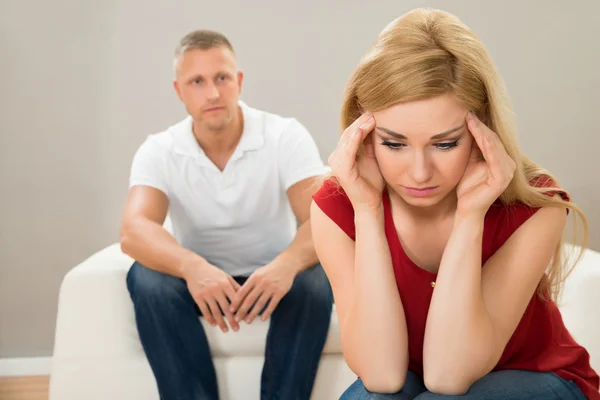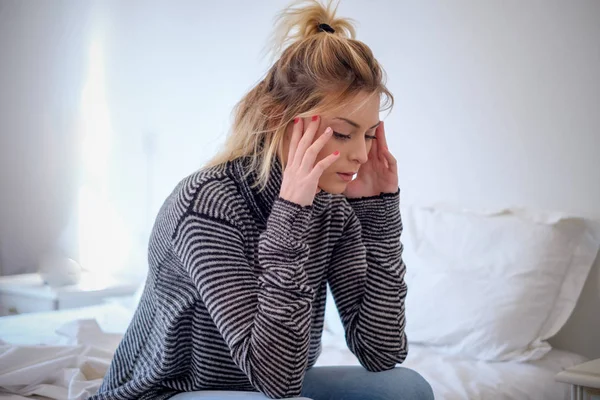When faced with uncertain or possibly stressful events, anxiety is a normal reaction. But when it persists in a relationship, it can have a negative effect on both the relationship’s health and the emotional health of the woman. Past experiences, insecurities, or a fear of the unknown can all contribute to relationship anxiety, which causes overanalyzing and a persistent uneasiness.
The origins, signs, and methods for overcoming relationship anxiety are examined in this article, with an emphasis on the experiences of women.

Anxiety In Relationship For Women
Excessive worry or fear about different facets of a love relationship is known as relationship anxiety. This could involve worries about compatibility, commitment, or faithfulness. These anxieties are frequently made worse for women by both personal and cultural demands, which makes it hard for them to unwind and enjoy the relationship.
To effectively handle relationship anxiety, one must first understand what causes it.
Common Causes of Relationship Anxiety in Women
Past Traumas: Anxiety can be a coping mechanism for women who have been in abusive, betrayed, or infidelity-prone relationships.
Attachment Styles: Clinginess or a fear of being abandoned in adult relationships are symptoms of anxious attachment styles, which are frequently formed in infancy.
Problems with self-esteem: Anxiety can be exacerbated by low self-esteem, which can cause one to question whether they are deserving of affection and support.
Social Expectations: Women are frequently subjected to excessive pressure by cultural norms to maintain “ideal” relationships, which can make them feel even more inadequate.
Signs of Anxiety in Relationships
Emotional Indicators
Women who suffer from relationship anxiety may worry about their partner’s devotion or sentiments all the time. This might consist of:
enduring anxiety over being rejected or left behind.
overanalyzing every communication, whether it be over text or face-to-face.
inability to trust their relationship, especially in the absence of betrayal evidence.
Manifestations
Additionally, anxiety can show up physically, resulting in:
sleeplessness and restlessness.
headaches or stomachaches during a fight.
exhaustion brought on by ongoing tension.
Patterns of Behavior
Relationship anxiety frequently affects actions like:
looking for a partner’s continuous assurance.
avoiding confrontation, even at one’s own expense, in order to preserve peace.
exhibiting excessive jealousy or control in an attempt to feel safe.
The Impact of Anxiety on Relationships
Strains on Communication
Open and honest conversation might be impeded by anxiety. Anxious women may find it difficult to communicate their emotions effectively, which can result in miscommunications and unsolved disputes.
Reduced Closeness
Overanalyzing and worrying all the time can lead to mental boundaries that diminish both emotional and physical connection. This conduct can cause a spouse to feel alienated or perplexed.
The Guilt and Anxiety Cycle
Women who experience anxiety may feel “too needy” or “burdensome,” which frequently results in shame. This damages the relationship even more by starting a vicious cycle in which shame feeds fear.
Overcoming Relationship Anxiety
Self-awareness and Reflection
It is critical to comprehend the underlying causes of your worry. Women might find patterns and triggers by journaling, practicing meditation, or talking to a trusted friend.
Fostering Positive Interaction
Communicate Your Emotions: Express your concerns to your partner in a calm and clear manner.
Active listening builds mutual trust by making sure that each person feels heard and understood.
Establishing Limits
Setting limits in relationships and personally aids in defining what is appropriate, gives one a sense of control, and lowers anxiety.
Looking for Expert Assistance
Counselors and therapists can provide helpful methods and strategies for dealing with relationship anxiety, such as Emotionally Focused Therapy (EFT) or Cognitive Behavioral Therapy (CBT).
Supporting a Partner with Anxiety
Encouraging Open Dialogue
Partners can be extremely helpful in reducing anxiety by establishing a secure environment for dialogue. Women feel more secure and supported when their emotions are acknowledged without passing judgment.
Steer clear of triggers
Partners can prevent actions that could inadvertently make a woman’s anxiety worse by being aware of what makes her feel anxious. For example, prompt communication can help avoid needless anxiety and overanalyzing.
Understanding Relationship Anxiety in Women
The extreme concern, dread, or doubt that a person feels in romantic relationships is known as relationship anxiety, and it frequently causes tension and uneasiness. This kind of worry in women may result from a confluence of emotional vulnerabilities, cultural expectations, and personal experiences.
The first step to effectively controlling and addressing it is comprehending its underlying origins and symptoms.
What is Relationship Anxiety?
An overpowering sense of worry or concern regarding the security and stability of a love relationship is a hallmark of relationship anxiety. This anxiety is a chronic condition that can influence one’s feelings, ideas, and actions in the relationship; it is not merely a passing concern.
In psychology, attachment theory—which holds that our early relationships with caregivers influence our adult attachment styles—is frequently linked to relationship anxiety. Women who have an anxious attachment style could have a greater need for validation and worry about losing their partner’s love or loyalty.
Relationship anxiety frequently results from cognitive distortions, which are negative thought patterns that intensify worries about failure, rejection, or inadequacy. Women could internalize ideas like “I am not good enough for my relationship,” or “What if they get married?
Common Triggers for Relationship Anxiety
Women may have relationship anxiety for a variety of reasons. A deep-seated fear of abandonment or betrayal might result from past trauma, such as a history of emotional neglect, infidelity, or assault. It can be challenging for women who have gone through such experiences to completely unwind and feel safe in their current relationships since they may harbor unresolved trust concerns.
Social forces are also quite important. An unreasonable expectation of relationship perfection is created by cultural narratives that frequently encourage women to perform exceptionally well in their roles as partners, caregivers, and supports. Anxiety regarding one’s value or place in the relationship might result from feeling inadequate and being afraid of falling short of these standards.
Signs You May Be Experiencing Relationship Anxiety
Effectively resolving relationship anxiety requires an understanding of its symptoms. Women who suffer from relationship anxiety may experience ongoing emotional concerns, feelings of insecurity, or terror related to the relationship. These feelings could show up as envy, an obsessive demand for reassurance, or an overevaluation of their partner’s words and behavior.
Relationship anxiety can manifest behaviorally as clinginess, a lack of confidence in the partner, or even a fear of getting wounded that prevents one from pursuing deeper closeness. Some women may provoke disputes or look for continual confirmations of love as “testing” behaviors to determine their partner’s level of commitment. Others may emotionally detach themselves as a defensive tactic.
Anxiety frequently manifests physically as symptoms like elevated heart rate, restlessness, exhaustion, or difficulty falling asleep. Women may have tenseness in their bodies or gastrointestinal issues.

The Impact of Anxiety on Relationships
Relationship dynamics can be greatly impacted by anxiety, which can change how people connect, engage, and feel their connection to their relationships. Relationship anxiety frequently negatively impacts women’s mental health, communication styles, and capacity to build closeness and trust. Addressing the difficulties anxiety causes in relationships requires an understanding of these effects.
Emotional Toll on Women
For women in relationships, anxiety may be a significant emotional weight that shows itself as tension, self-doubt, and ongoing worry. Even when there is no exterior confrontation, this ongoing uneasiness frequently causes women to doubt their worth and place in the relationship.
They could become caught up in a pattern of overanalyzing, reading their partner’s words and behavior in ways that validate their greatest anxieties, such feeling unworthy or unloved. A diminished ability to enjoy the relationship as well as emotions of weariness, irritation, and despair can result from this emotional pressure.
Women frequently feel as though they are bearing the burden of the relationship alone because of their internal struggle with dread and self-doubt, which prevents them from enjoying true emotional stability.
Challenges in Communication
Any healthy relationship is built on effective communication, but anxiety can make this extremely difficult. Women who suffer from relationship anxiety may find it difficult to communicate their emotions honestly out of fear of criticism, rejection, or confrontation. As a result, crucial discussions may be diluted or avoided, which could result in miscommunications and unsolved problems.
On the other hand, anxiousness can occasionally lead to an overcompensation in communication, as women overly ask their spouses for clarification or confirmation. The spouse may become overwhelmed by this desire for approval, which could lead to tension or resentment.
Due of anxiety’s ability to warp perceptions, women frequently misinterpret neutral or positive behaviors as threatening or negative. For example, failing to reply to a text message right away could be interpreted as an indication of indifference or rage, which would
Effects on Intimacy and Trust
Intimacy and trust—two essential components that promote intimacy and vulnerability in a relationship—can also be harmed by anxiety. Women who struggle with relationship anxiety could find it hard to lower their defenses because they worry about being rejected or betrayed if they show who they really are.
Emotional connection is frequently impeded by this dread, making partners feel estranged or unconnected. Anxiety can also affect physical intimacy since it can cause a lack of desire or make it harder to feel at ease in private situations. It might be difficult for women to fully engage with their partner on an emotional or physical level when they are preoccupied with anxieties or insecurities.
Root Causes of Relationship Anxiety in Women
Women’s perceptions of themselves and their roles in love relationships are shaped by deeply rooted experiences and societal pressures, which frequently lead to relationship anxiety. We can better comprehend the effects of this anxiety and offer solutions for recovery by examining its underlying origins, which can include everything from early life events to cultural norms and personal fears.
Childhood Experiences and Attachment Styles
Childhood has a significant impact on how people view and handle relationships. Women may acquire anxious attachment styles if they are raised in homes where their emotional needs are either unfulfilled or just partially met. A child who had an emotionally unavailable or overly critical caregiver, for example, may internalize feelings of unworthiness,
which could lead to insecurity in future romantic relationships. A heightened fear of rejection or abandonment in adult relationships can result from these early experiences. Because of the emotional patterns they were taught as children, women with an anxious attachment style may find themselves constantly seeking reassurance,
overanalyzing their partner’s behavior, or worrying that they are not loved enough. Effective relationship anxiety management requires an understanding of and attention to these attachment dynamics.
Societal Expectations and Gender Roles
Women are frequently subjected to strict expectations and prejudices from society that dictate how they should act in love relationships. Cultural standards may put pressure on women to put their partner’s needs first, keep up a beautiful appearance, or play conventional roles like being selfless and nurturing.
Women may experience anxiety as a result of these expectations because they worry about not living up to social norms or receiving severe criticism for not playing the roles that are expected of them. Furthermore, by establishing irrational standards for love and commitment, the media’s representation of idealized relationships frequently makes this fear worse.
For instance, the need to be independent but emotionally available can lead to internal tensions, making women question their value or the sincerity of their relationships.
Personal Insecurities and Self-Worth
Relationship anxiety is significantly influenced by low self-esteem. Women who battle internal doubts frequently put their anxieties onto romantic relationships, questioning the commitment or affection of their partner. These insecurities could be the result of critical self-perception, rejection experiences, or previous relationships.
In an attempt to make up for their inner uncertainties, women who believe they are not “good enough” may become unduly reliant on their partner’s approval. This dependence might cause stress in the relationship and prolong the worry cycle. Breaking out from this tendency requires developing a positive sense of self-worth.
In order to promote emotional stability and lessen relationship anxiety, it is important to celebrate one’s accomplishments, encourage self-compassion, and acknowledge one’s worth regardless of a romantic partner.
Strategies to Manage and Overcome Relationship Anxiety
Open and Honest Communication
A strong relationship is built on communication, and the first step in treating anxiety is to be honest and upfront about how you feel. Women who suffer from relationship anxiety frequently worry that talking about their issues will alienate their partner or cause arguments.
But suppressing feelings might result in miscommunications and increased worry. Rather, it is critical to establish a secure environment for discussion. Expressing emotions without placing blame on the partner is made easier by using “I” phrases, such as “I feel anxious when…” in place of accusing language.
Establishing routine check-ins to talk about expectations, boundaries, and feelings can improve the relationship and allay anxieties. Additionally, active listening promotes trust and emotional intimacy when both partners pay close attention to and validate each other’s viewpoints. Anxiety can be turned into a chance for development and connection through effective communication.
Practicing Self-Care and Emotional Regulation
Making self-care and mental health a priority is also necessary for managing relationship anxiety. People who disregard their physical, mental, or emotional well-being frequently experience increased anxiety. Self-care practices, such consistent exercise, a balanced diet, and enough sleep, can greatly lower stress and increase resilience.
Developing a sense of control and calming anxious thoughts are two benefits of emotional regulation practices including journaling, deep breathing, and mindfulness meditation. Hobbies and other personal interests can help people feel more fulfilled and unique, which lessens the need to rely entirely on a spouse to make them happy.
Women who put an emphasis on taking care of themselves develop the inner fortitude required to approach their relationships with stability and confidence.
Seeking Professional Help
Professional support is an invaluable resource because relationship anxiety can occasionally feel overwhelming despite best efforts. Women can recognize and modify harmful thought patterns that are causing their anxiety with the aid of therapy choices like Cognitive Behavioral Therapy (CBT).
Couples counseling improves mutual support and understanding by giving partners a safe space to work together to address problems. Mindfulness techniques, which are frequently included into treatment, encourage people to stay in the moment and lessen the emotional toll that intrusive thoughts take.
It is not a show of weakness to ask for help; rather, it is a proactive move toward better relationships and emotional wellness. Women can create customized anxiety management plans and strengthen their bonds with their partners by consulting with a qualified specialist.

FAQs:
Are women more likely to have relationship anxiety?
Yes, women of all ages can have relationship anxiety, which is rather frequent. These emotions are frequently influenced by emotional histories, societal expectations, and individual vulnerabilities.
Can a relationship be ruined by relationship anxiety?
Relationship anxiety can cause intimacy and communication problems, which may result in conflict or separation if ignored. Nonetheless, this fear can be controlled and even conquered with the correct techniques.
In what ways may partners support women who suffer from relationship anxiety?
When needed, partners can encourage their loved one to seek professional assistance, practice patience, and offer reassurance. To overcome these obstacles jointly, open communication is essential.
Conclusion:
Women’s relationship anxiety is a complicated problem with sociological, psychological, and emotional roots. Understanding and treating the causes can result in better, healthier connections, even though it can provide major hurdles. Women can turn their fears into chances for personal development and increased closeness by cultivating self-awareness, looking for help, and establishing open lines of communication.
Keep in mind that getting over relationship anxiety is a journey, but it is worthwhile for both you and your partnership.